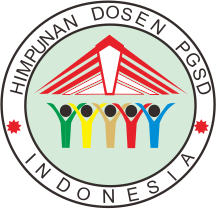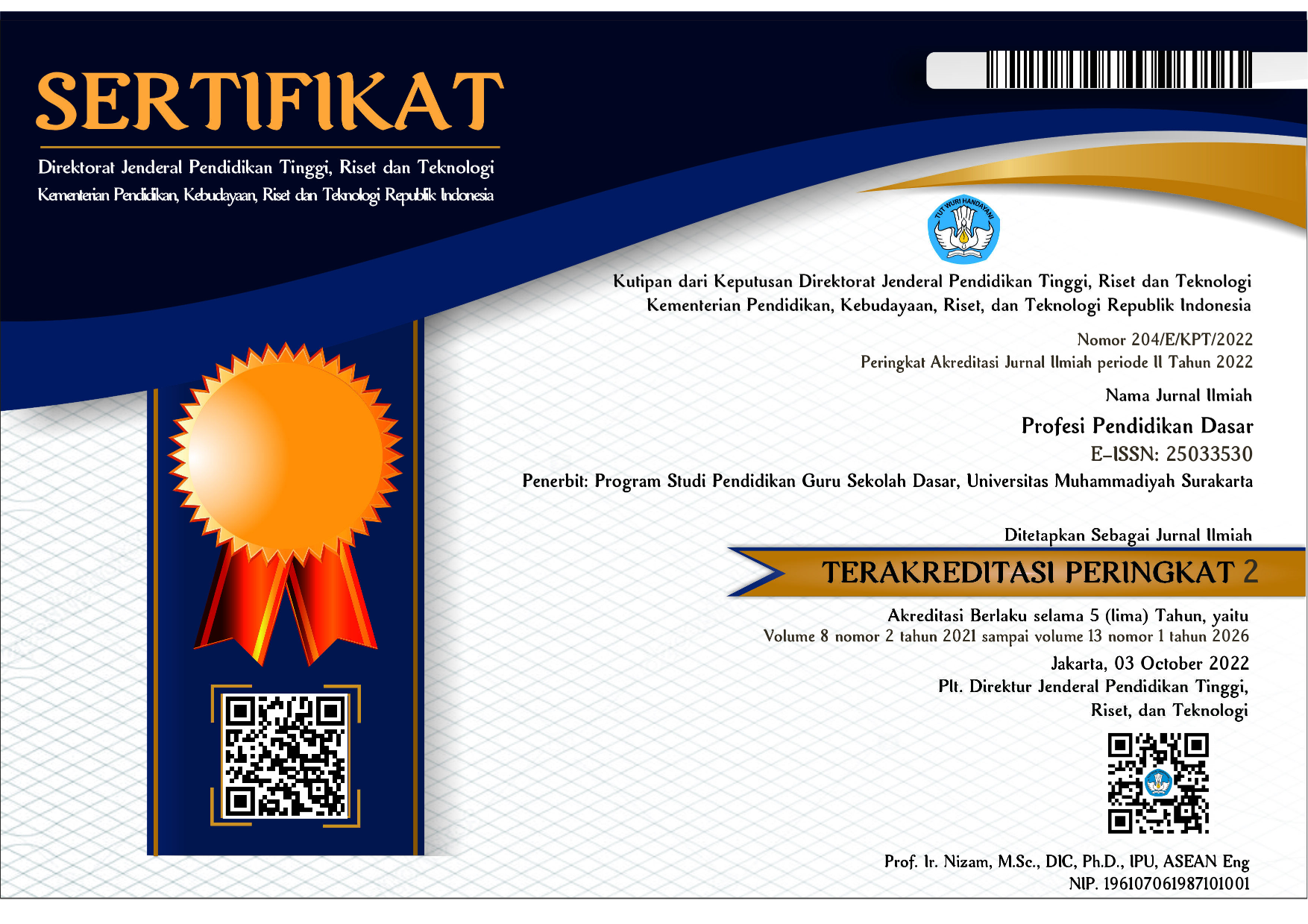PENINGKATAN RASA PERCAYA DIRI SISWA DALAM PEMBELAJARAN MATEMATIKA MELALUI ACTIVE LEARNING TIPE ACTIVE KNOWLEDGE SHARING DENGAN PENDEKATAN SAINTIFIK
Nurdin Kamil(1*), Jailani Jailani(2)(1)
(2) Universitas Negeri Yogyakarta
(*) Corresponding Author
Abstract
Keywords
Full Text:
PDFReferences
Aalst, Van J.. (2009). Distinguishing knowledge-sharing, knowledge-construction, and knowledge-creation discourses. International Journal of Computer-Supported Collaborative Learning, 4(3), 259–287.
Ariasa, Kd, dkk. (2014). Pengaruh model pembelajaran active knowledge sharing terhadap hasil belajar matematika siswa kelas V SD. Jurnal Mimbar PGSD Universitas Pendidikan Ganesha, 2 (1).
Aurilla, Arntzen Bechina. (2006). Knowledge Sharing Practices: Analysis of Global Scandinavian Consultant Company. Electronic Journal of Knowledge Management. Volume 4 Issue 2 (109-116)
Britner, S. L., & Pajares, F. (2006). Sources of Science Self-Efficacy Beliefs of Middle School Students. Journal Of Research In Science Teaching, 43(5), 485–499. https://doi.org/10.1002/tea.20131
Carey, S.S. (2011). A beginner’s guide to scientific method Learning (fourt Edit). Wadsworth : Cengage Learning.
Gloria Yi. (2008). Beyond Sharing : Engaging Students in Cooperative and Competitive Active Learning. International Journal of Educational Technology and Society. Vol. 11 (3) : 82-96
Hakim, Thursan. (2002). Mengatasi Rasa Tidak Percaya Diri. Jakarta. Puspa Swara.
Hazen, R. M. and Trefil, J. (1991) Science Matters: Achieving Scientific Literacy. New York: Doubleday
Hendrizal. (2015). Penerapan model active knowledge sharing pada pembelajaran matematika. Jurnal Pelangi, 7, (2).
Hisyam Zaini. (2007). Strategi Pembelajaran Aktif. Yogyakarta: CTSD IAIN Sunan Kalijaga
Kemendikbud. (2013). Materi pelatihan guru implementasi kurikulum 2013 SMA matematika. Jakarta: Kemendikbud
Lauster, P. (2002). Tes Kepribadian. Jakarta. Gaya Media Pratama.
Mahmudi, Ali. (2009). Komunikasi dalam Pembelajaran Matematika. Jurnal MIPMIPA UNHALU. 8 (1).
Moore, K. D. (2009). Effective Instructional Strategies. Los Angeles: SAGE.
Nola, R., & Sankey, H. (2010). Theories of scientific method: An introduction. Swansea: Imprimatur.
Paulin, D., & Suneson, K. (2012). Knowledge transfer, knowledge sharing and knowledge barriers – three blurry terms in KM. Electronic Journal of Knowledge Management, Vol. 10 No.1, h.81–91.
Prasetyo, T., & Fitri, A. (2018). Pengaruh Pendekatan Ilmiah Memadukan Pembelajaran Penemuan Terbimbing terhadap Rasa Ingin Tahu Siswa. Didaktika Tauhidi: Jurnal Pendidikan Guru Sekolah Dasar, 5(April), 15–28.
Purnamasari, R., Handayani, R., & Novita, L. (2016). Penerapan Pembelajaran Kooperatif Tipe Jigsaw berbasis Lesson Study untuk Meningkatkan Aktivitas Kolaboratif Mahasiswa PGSD pada Mata Kuliah Pendidikan Matematika I. Jurnal Pendidikan Sekolah Dasar (JPSD), 2(2), 166–180.
Sheldrake, R. (2016). Confidence as motivational expressions of interest, utility, and other influences: Exploring under-confidence and over-confidence in science students at secondary school. International Journal of Educational Research, 76, 50–65.
Sopia, H. F. (2016). Kepercayaan Diri Mahasiswa PGSD Universitas Muhammadiyah Tangerang Pada Mata Kuliah Konsep Dasar Matematika. Jurnal Pendidikan Sekolah Dasar (JPSD), 2(2), 117–124.
Susanto, Ahmad. (2013). Teori Belajar dan Pembelajaran Di Sekolah Dasar. Jakarta: Kencana Prenada Media Group.
Usher, E. L. (2008). Sources of Self-Efficacy in School : Critical Review of the Literature and Future Directions. Review of Educational Research, 78(4), 751–796. https://doi.org/10.3102/0034654308321456
Article Metrics
Abstract view(s): 983 time(s)PDF: 738 time(s)
Refbacks
- There are currently no refbacks.


















